Even Cannibals have a human side.
Much has been made of Tadej Pogačar’s relentless ambition in the sport, with rivals grumbling about his drive to win as much as possible at the Tour de France and other races.
Pogačar made headlines this week when he said he didn’t care what others think about that hunger but, to those who know him, what is the Slovenian really like?
Family, teammates, staff, and rivals within the peloton have given their thoughts on the best rider since Eddy Merckx.
Their assessment paints a more complete picture of the Tour de France leader than can be gleaned from his reputation and his interviews alone.
They give an insight into his personality off the bike and away from the limelight, giving a more nuanced perspective on the day-to-day character of the world’s top rider.
‘I still can’t believe this happens to our family’
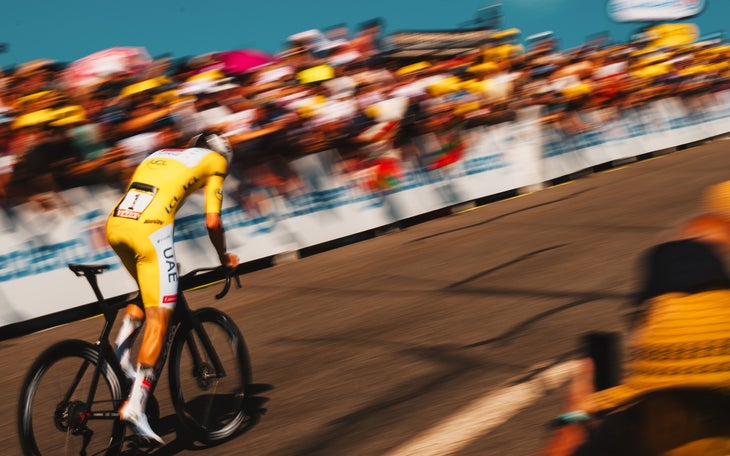
Perhaps no one knows the Tour de France leader better than his mother. Marjeta Pogačar has a particular memory of Tadej as a child that illustrates his determination.
“If Tadej couldn’t achieve something the first time, he tried again and again,” she told Velo. “For example, he taught himself how to walk. We didn’t teach him.
“He tried and tried and tried. He stood up, fell down, he tried to make one step, he fell down. He repeated it until he could walk.
“He was 11 months and one week. He was very young.”
Marjeta and her husband Mirko were in attendance at the UAE Tour this February, along with Pogačar’s younger sister Vita. They were feted at the race — little wonder, given the spotlight he was getting day after day — but seemed somewhat uncomfortable with the attention.
Down to earth, straightforward, they were clearly proud of Tadej and a little bemused by it all.
“I still can’t believe that this happens to him, to our family,” Marjeta told me, speaking at the stage 5 start at the American University Dubai.
The family bond was very clear at the race. Not just amongst themselves, but with their famous son too. He greeted his parents and sister each day in the buildup to the stage start, taking time to speak to them, making sure they were okay.
He has, she says, always had a caring nature, even as a youngster.
“He was always joking. But when he felt some tension in the family, he tried to cheer us up.”
Years later those same traits would be seen with another loved one.
Offering to quit the Tour
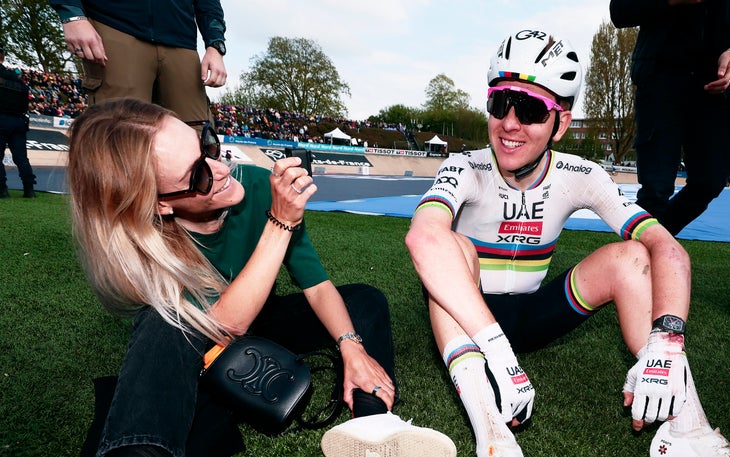
Urška Žygart is a professional cyclist with the AG Insurance-Soudal team. The 28-year-old is talented climber who finished fifth overall in this year’s Tour de Suisse Women.
Two years ago, she was competing in the Giro Donne and crashed hard on stage 6. She sustained a concussion and had to leave the race, heading home early.
Pogačar has been her partner for many years. They originally met during a training camp of their-then cycling club in Ljubljana, Slovenia’s capital.
Her accident happened on July 7, 2023, the same day that he lost 1:04 to Jonas Vingegaard on stage 5 of the Tour.
He had started that race below par due to a fracture sustained two and a half months earlier at Liège-Bastogne-Liège.
At the time, the media reported that he was demoralized and wanted to leave the race but that Žigart convinced him to stay. There’s a grain of truth in that, but she says it was his empathy rather than his disappointment which was the factor.
“It was just about my crash, not about his performance or anything that day,” she told Velo. “I mean, the Tour was just five days old. And he’s not the type of a guy who would just give up at that point.
“It was more just him trying to comfort me. He thought that I would need more help at home.”
That the double Tour winner would consider exiting the race says a lot about their relationship. She said that is his nature, and that she had to push back.
“Of course I said no. ‘It’s the Tour,’” she told him. “‘You’ve been working since the day after your crash so hard to just be there and no, you’re not coming home.’”
He stayed and won the stage the following day.
‘If he didn’t win, he wasn’t upset’
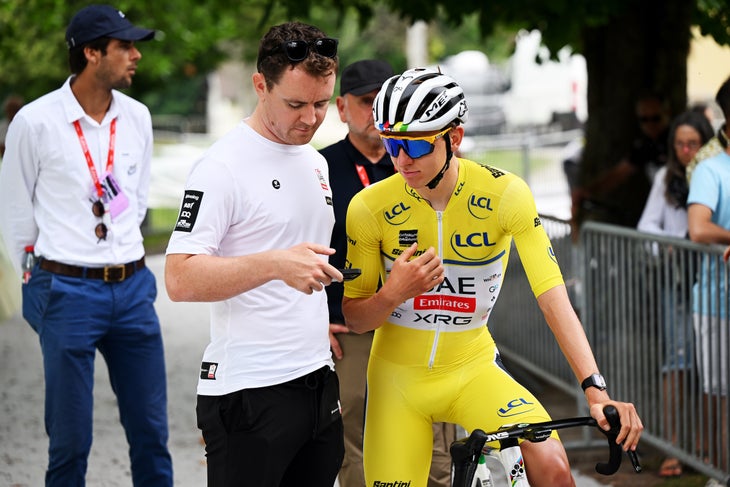
In interviews Pogačar has often thanked his parents. That’s due in part to his upbringing and his appreciation of how he was raised. But he’s also said — half seriously — that they gave him the genetics which have stood to him so well in his career.
Marjeta Pogačar said there were very early signs of his interest in sport, and also of his ability.
“When he was very young he was moving all the time around the house,” she said. “But when he was 7, when he entered school, he started to train for football for two years. And then he moved to the cycling at the age of 9.
“He was very good. He was very competitive. He tried to do his best.”
She remembers him as being hungry to do well but also having a sense of perspective.
“He was very competitive. When he played games, if he didn’t win, he wasn’t angry or upset. He accepted the defeat. But when he won, he was very happy.”
That attitude persisted as he got older. His natural talent saw him often be successful but when things didn’t go quite to plan, he didn’t get too demoralized.
He had a way of celebrating the good, acknowledging the bad, and moving on either way.
Winning was important, winning was fun, but it wasn’t the only thing in his life. He could look beyond the immediate and see the bigger picture.
Luke Maguire has been press officer with the UAE Team Emirates squad since August 2019. His first stint with the team was at that year’s Vuelta a España which, by coincidence, was Pogačar’s first three-week race.
The Irishman remembers a moment from the 2021 Tour when the defending champion had just finished one of the biggest stages. Drained, surrounded by the chaos and noise of the race, his thoughts were suddenly elsewhere.
“He had crossed the line, he sunk his head in the bars, but then he lifted it up and said, ‘how did Urška get on?’ That was the first thing he said,” Maguire said. “And that was after he was fighting it out in the yellow jersey.
“She was also racing at the same time. That’s all he cared about at that moment. He was literally out of breath, he was dead. But, ‘how did Urška get on today?’”
Top athletes are known to have extraordinary tunnel vision, an ability to filter out distractions and deal with the task at hand.
Pogačar can do that, but can also switch right off afterwards.
“His ability to place himself elsewhere is incredible,” Maguire continues. “‘This is just cycling,’ is what he will say a lot. ‘I have a great life. I’m lucky. I get to go out on my bike.’
“That is probably what keeps him calm and cool. Looking out for other people, I would say.”
‘If someone is stronger he accepts this’
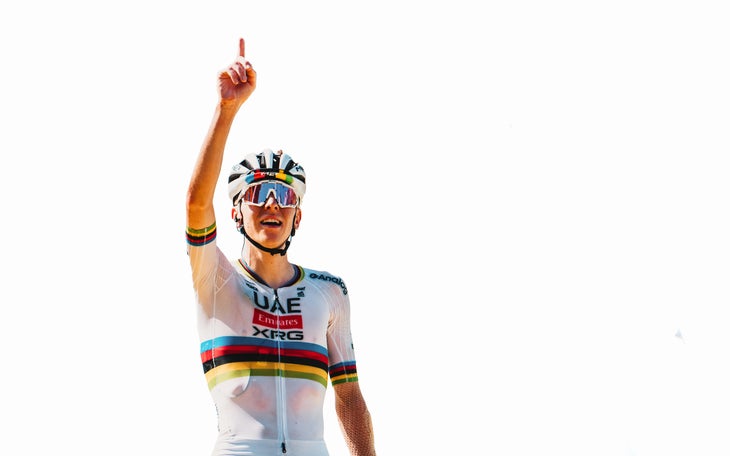
In cycling, there has been a bit of a sea change in recent times in how the top riders behave. Years ago there were more bitter rivalries; Tour rivals would trash talk each other, sniping about perceived slights, playing psychological games.
One example of that comes to mind from Pogačar’s career. Think of the 2024 Tour de France, when he and Remco Evenepoel put pressure on Jonas Vingegaard to ride with them when they were clear on the gravel stage to Troyes.
The Dane declined to do so, reasoning that if he pulled he would be vulnerable to attack. There were some pointed words from both riders afterwards, with Evenepoel even saying Vingegaard lacked the “balls” to ride. But generally there is a considerable amount of respect.
Pogačar and Vingegaard readily congratulate each other after their respective successes. He does the same with other rivals such as Mathieu van der Poel, clasping raised hands, voicing complements, sharing a laugh.
It’s something which has mystified former professionals such as Lance Armstrong, who has expressed confusion and criticism about these modern, more friendly relationships.
But according to UAE Team Emirates-XRG manager Mauro Gianetti, his star rider has this clear sense of perspective.
He gives his all with conviction; he accepts the result with maturity.
He describes the Slovenian as ‘very intelligent,’ and also as someone who needs to give 100 percent both before a target event and during it.
“If he does his training properly, if he sleeps properly, if he has good food, if he has good wheels, good tires and so on, then he is relaxed,” the former pro told Velo.
“Then he goes into races saying, ‘okay, if I am the strongest I win. If not I don’t win. But at least I know I do everything 100 percent.’
“He knows he will do his best. And if his best means he will win, that is perfect. If someone is stronger, he accepts this, because this is life.”
A rare show of anger
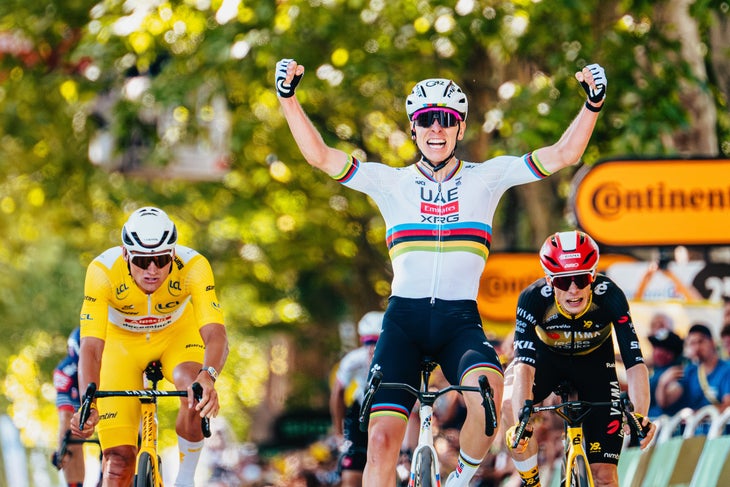
The 2022 Tour of Flanders does stand out as an unusual response. The quiet acceptance of the result Gianetti speaks about was absent that day, with a two-man breakaway by Pogačar and Van der Poel losing momentum in the run up to the sprint.
Each wanted the other to lead, and this allowed Dylan van Baarle and Valentin Madouas to catch them. Pogačar got boxed in and finished fourth.
He rolled across the line with his hands waving and was captured on camera having words with Van Baarle.
“That was out of pure frustration,” Maguire told Velo. “As people said, he was the only man in history to finish fourth in a two man sprint. But it is very rarely like that.
“He can get a bit excited at times, but you can neutralize it very, very quickly. And he calms back down. He understands straight away. He’s very smart guy. Very bright.”
Gianetti echoes this.
“In the race he wants do 100 percent. If he makes a mistake in the race then he is angry with himself and so on. If the sport director makes a tactical mistake, 10 minutes later it is finished. We start to think again for the future.”
‘He is a natural leader’
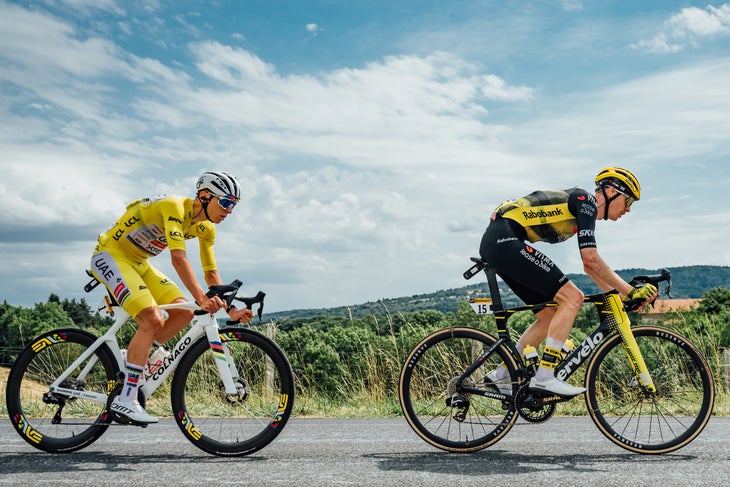
So what’s it like to be his teammate?
Brandon McNulty has ridden alongside Pogačar since the 2020 season. The former US national TT champion is a quiet, understated person. In another era he might have been pushed around by a forceable leader, but he seems happy with his lot.
“Tadej is just a normal guy,” he told Velo. “He is a nice guy, nice to work for. Nice to be teammates with. There’s nothing crazy, just normal. He’s not intimidating.”
The Danish rider Mikkel Bjerg has been with the team the same length of time. He rode for Pogačar during the 2021, 2022 and 2023 Tours. He will do the same in the upcoming Vuelta a España, where Pogačar could become only the fourth man in history to complete the Tour/Vuelta double in the same season.
Bjerg echoes the sentiment of McNulty.
“He is really down to earth,” Bjerg said. “He is a natural leader in the team. I think everybody feels really comfortable around him.”
“He makes people feel that way by just being genuine. Just being himself. He can get along with anyone. I think that also creates a really good environment for sacrifice for him. And it’s also partly due to the level he has – everybody is trying to get the best out of himself to help.”
The appreciation seems to go both ways. When Pogačar won the 2021 Tour de France he had a special thank you gift delivered to each of those who helped him.
Forget watches or other more traditional presents: bright yellow Vespa mopeds were quirky, memorable, and fun.
There was also a practical side to it too; Velo understands that at least one of the team’s riders has done motorpacing sessions behind their machine.
Winning big, staying normal
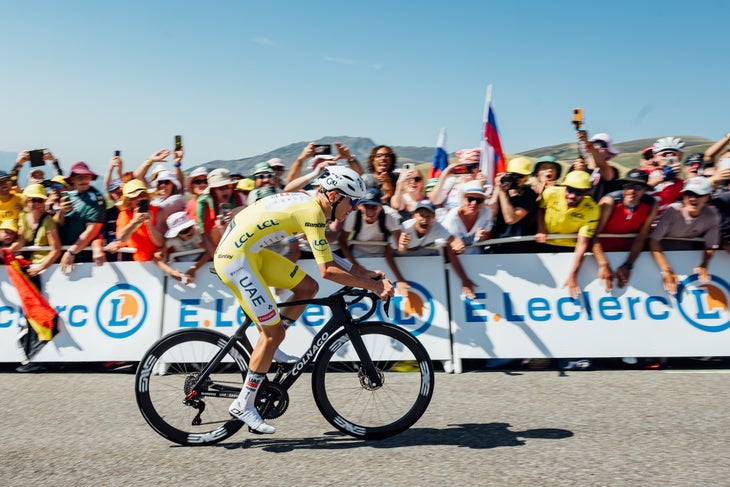
It’s not unexpected for those close to Pogačar to speak in glowing terms about him. After all, his teammates are the ultimate insiders, going into battle, fighting on the same side, trying to achieve the same goals. Given how often Pogačar wins, the mood will often be a celebratory one.
Everyone loves to be on the winning side, after all.
It’s perhaps a better measure of the man how those he competes against feel about him. The obvious warmth and respect between himself and Evenepoel says a lot. So too similar dealings with Van der Poel.
Their interactions with them appear genuine. And even if he and Vingegaard are very different, one an exuberant extrovert and the other a quiet introvert, there is also respect there too.
The affection others have for him too is notable. Michael Matthews and Eddie Dunbar both compete with the rival Jayco AlUla team, going up against Pogačar in numerous races.
They have lost out as a result of his strength and yet each are friends with him. That’s both in training rides around their shared base in Monaco, and also off the bike. Indeed Pogačar stores his sports car in Matthews’ garage.
“He is just a normal human being,” the Australian told Velo.
“It’s amazing for me how normal he is and how he has stayed normal, considering what he’s actually achieved in the sport. He’s done things which we haven’t seen in forever, basically.
“It says something for me that a guy like that can be so successful and still so grounded. He’s still that same Slovenian kid that loves riding his bike. That for me is massive respect.”
Away from the bike
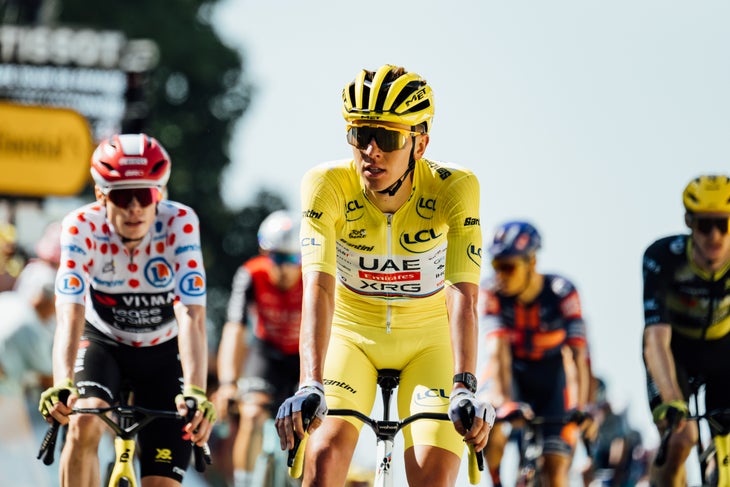
Dunbar lives in Monaco with his partner Niamh. He believes Pogačar is likely to go down in history as the greatest ever rider, exceeding the achievements of Eddy Merckx.
The specialist climber expresses similar sentiments to Matthews in terms of his ability to keep his feet on the ground.
“He is just a good guy, and very humble in a way,” the Irishman told Velo before the Tour. “I wouldn’t say the results he has get to his head. He’s just someone who genuinely enjoys riding his bike.
“He’s very aware of what he’s achieving, which he should be, because it’s incredible. But he’s very humble along with it.”
But what about outside cycling? Do they have anything in common when they are not turning the pedals?
“We’re very good friends off the bike,” he said. “Myself and Niamh, we are close to him and Urška, and they’re wonderful people.
“I have a lot of respect for what he does and who he is on the bike.
“But off the bike, he’s a great person.”
